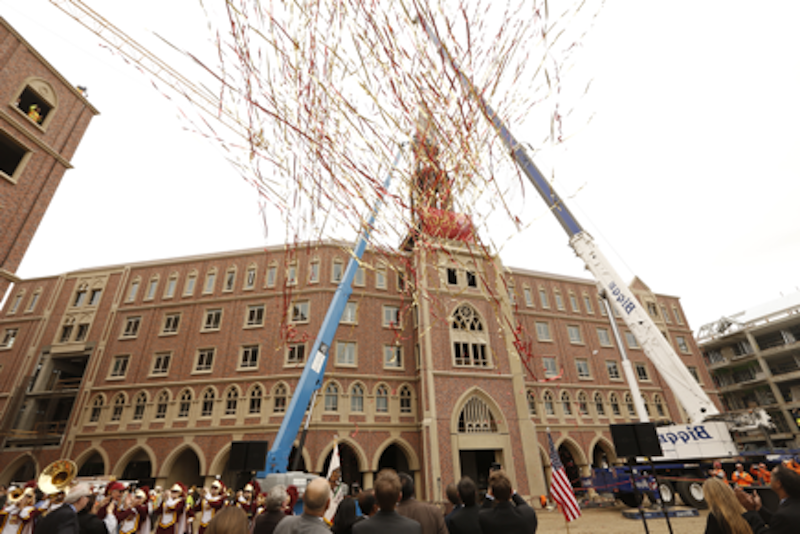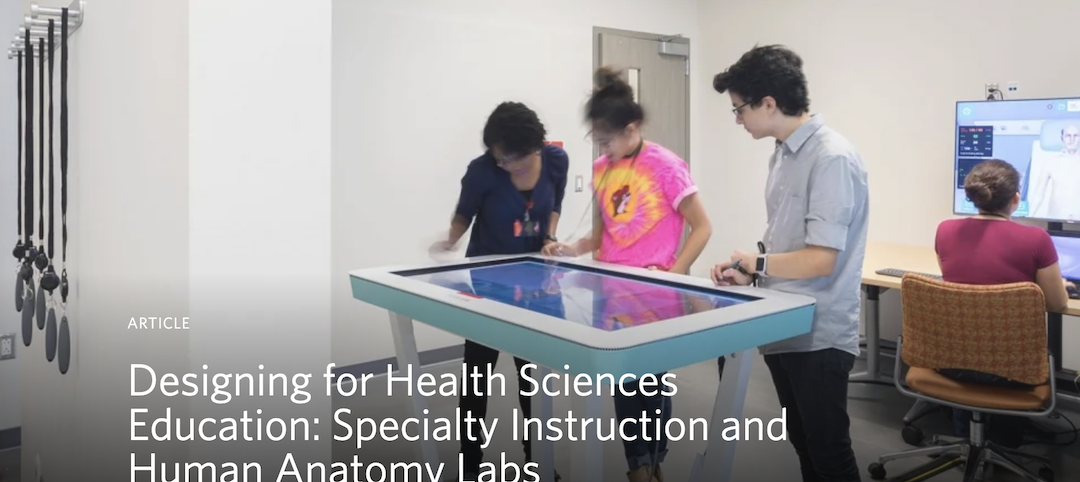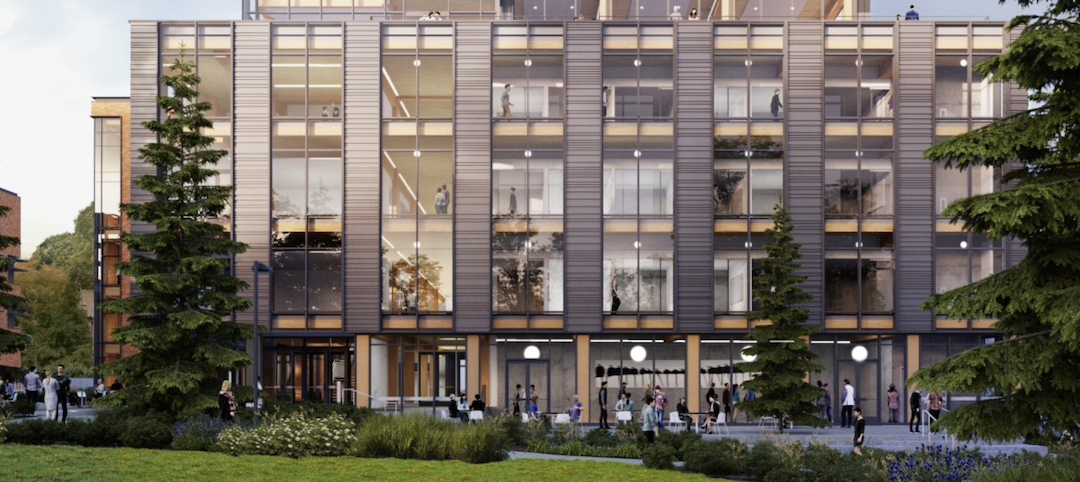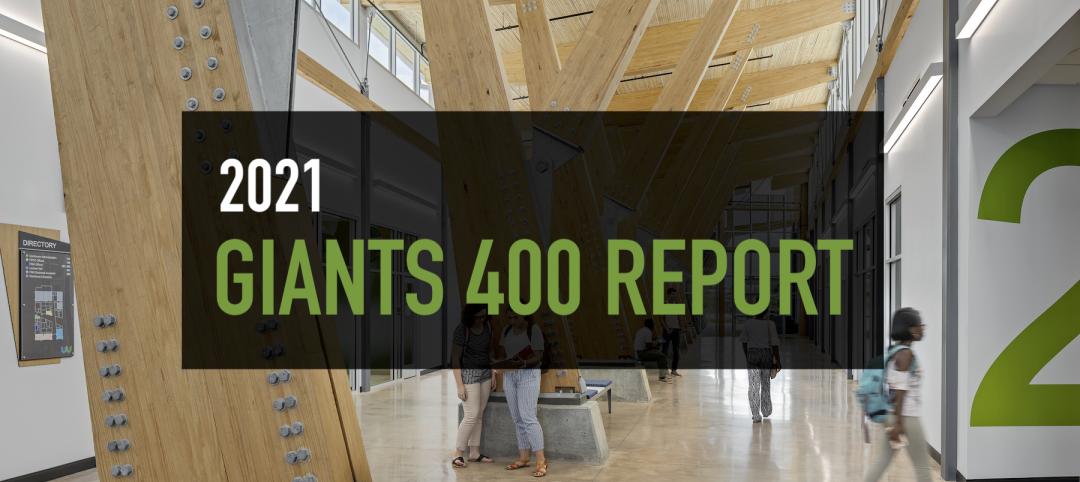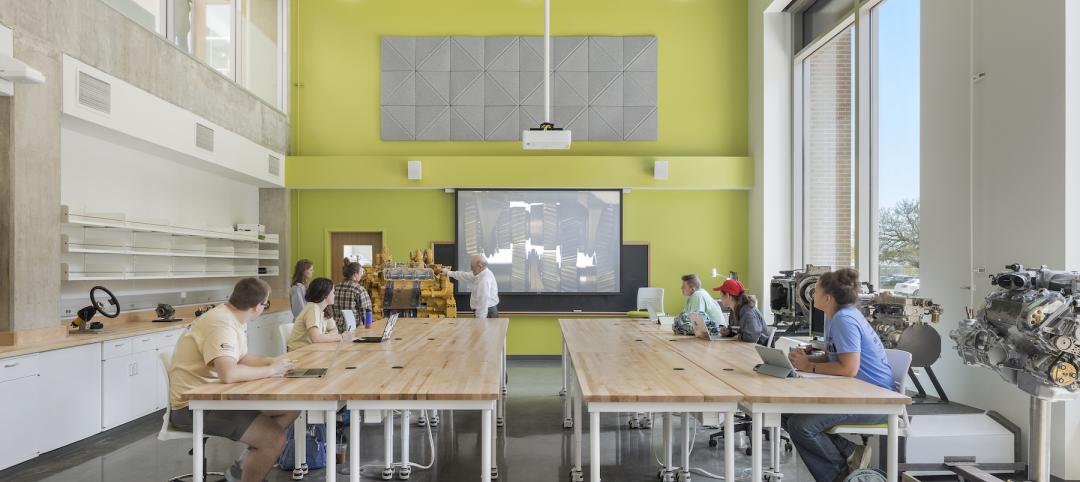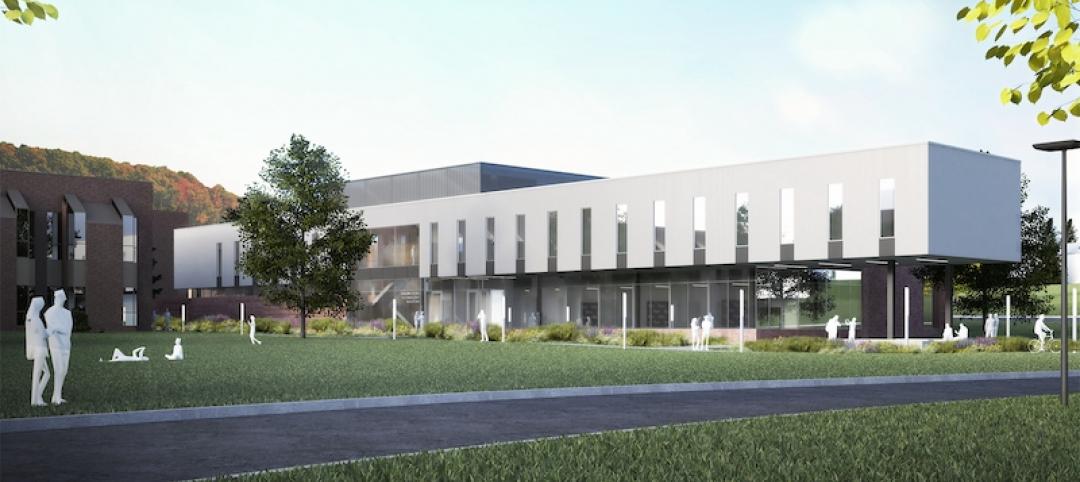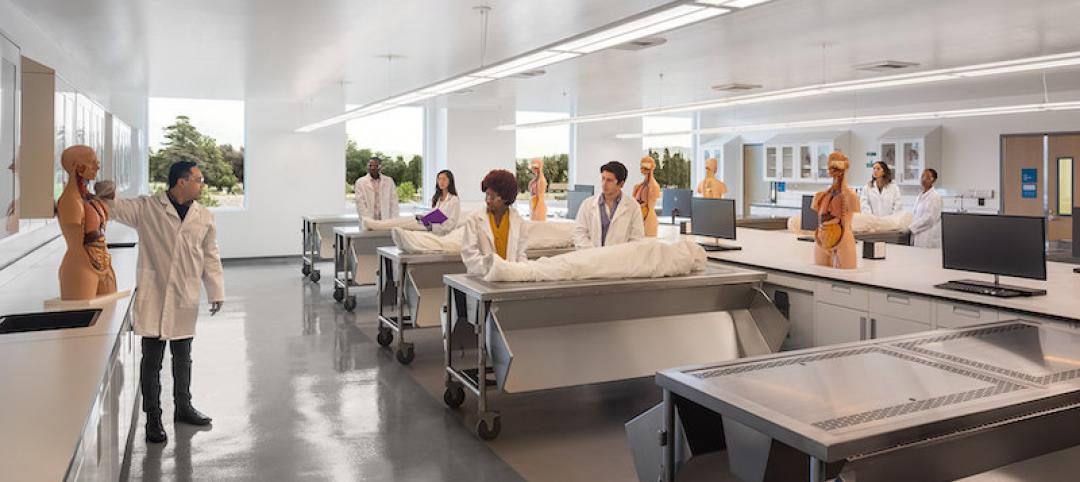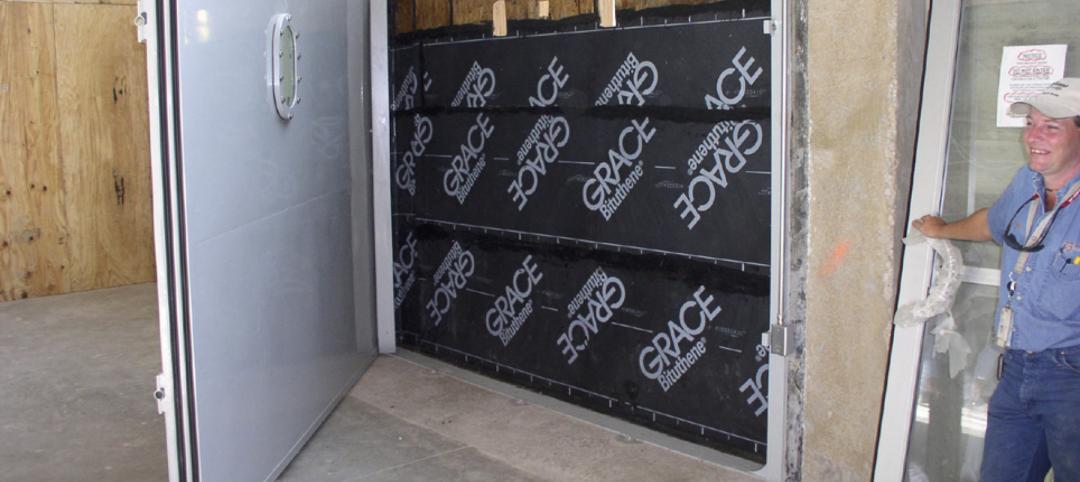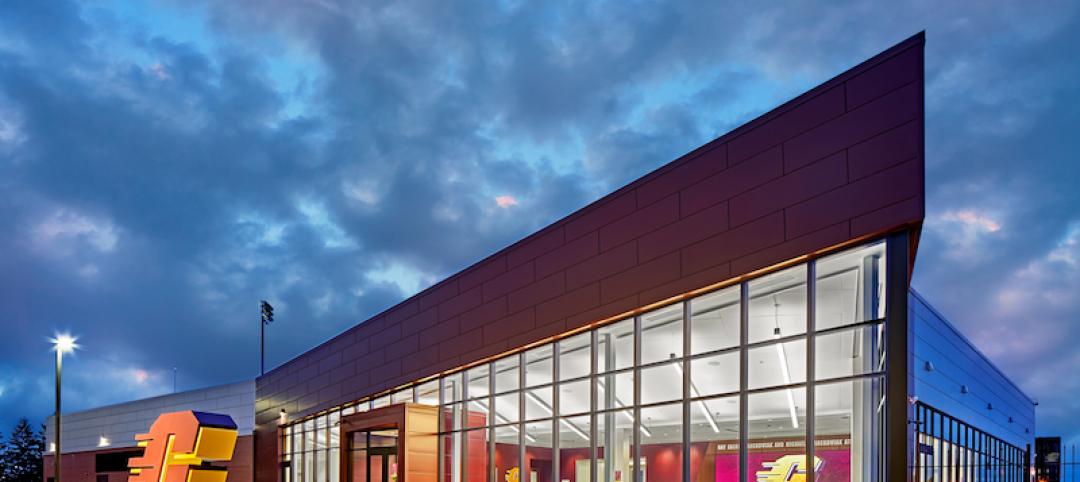This month, work crews began moving furniture, fixtures and equipment into USC Village, the biggest development project in the history of South Los Angeles, which is on schedule to be ready for the fall semester at the University of Southern California’s University Park campus.
The $700 million, 15-acre USC Village, which has been in the works since 2005, will consist of six buildings with a total of 1.25 million sf of space and 2,700 student beds. There will be eight residential colleges within USC Village, four of which had been endowed at presstime.
To view a flyover of the Village’s construction site, click here.
When USC Village was conceived, it was one of the first mixed-use residential college projects in the nation, and when completed it will include 100,000 sf of retail space for 30 tenants such as Bank of America, Starbucks, Target, and Trader Joe’s (which will be welcomed in South L.A. a food desert when it comes to supermarkets).
The Village will also have food and beverage outlets, and a 30,000-sf fitness center. The Village will provide 1,200 covered bike-parking slots, and another 500 slots for day-to-day bike parking by patrons of the gym or retail stores.
The exterior design of USC Village is best described as “collegiate gothic,” and reflects the mandate by USC’s president C.L. Max Nikias that the look of the Village be connected to the rest of the campus. “We could introduce any design feature, as long as it was gothic,” says Daniel Benjamin, AIA, LEED AP BD+C, Principal and Design Leader for Harley Ellis Devereaux, USC Village’s architect.
That meant a lot of detailing at the ground plane and roof level, but more traditional brick façade in the middle.
Benjamin notes that there weren’t enough masons in southern California to handle of project of this magnitude. So instead of importing workers from other parts of the state, the Building Team—which includes Hathaway Dinwiddie as the GC—decided to precast the concrete facades off site, typically delivered in 12- by 20-ft modules. Brick trimmed with sandblasted warm-colored concrete surrounds gives the buildings a three-dimensional sense of detail.
Prefabrication also cut the construction process, which began in June 2014, by nearly a year. These buildings are designed to last 80-100 years.
During the approval process, three major changes were made to USC Village’s plan, recalls Willy Marsh, USC’s director of construction. A large parking garage with a field on its roof became underground parking. High-rise residential towers became low-rise buildings. And a much larger retail center was de-emphasized. “The decision was made that retail wasn’t going to drive this project,” says Marsh.
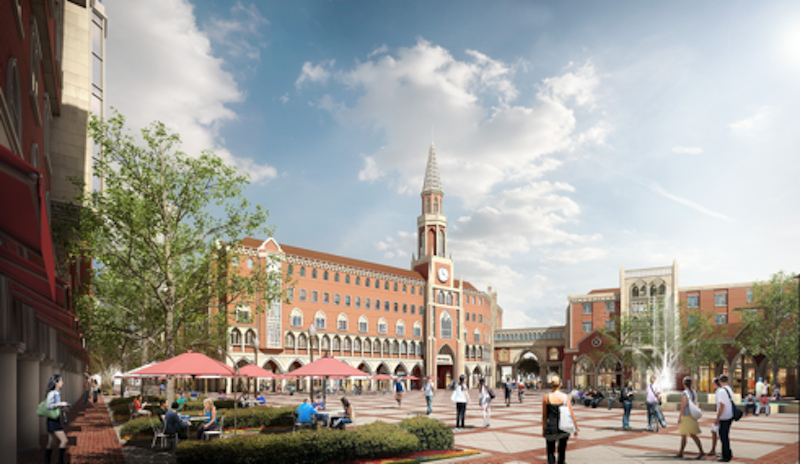
The buildings' facade consists of precast concrete and brickface that mimics older buildings on campus. Image: USC
USC Village comprises about 20% of the University Park campus, and Nikias, says Benjamin, wanted the connections to be seamless. So the Village’s pathways and streets flow seamlessly into the larger campus’s circulation routes. More than 200 trees will be planted within and around the Village.
This campus is an integral part of the surrounding community. As part of this project, USC is providing $40 million in community benefits, including a $20 million contribution to an affordable housing fund that is managed by the city.
The number of student beds could increase to 5,000 if USC decides to redevelop a 12-acre lot adjacent to USC Village. Marsh says that project could be a decade away.
Related Stories
University Buildings | Sep 28, 2021
Designing for health sciences education: Specialty instruction and human anatomy labs
It is a careful balance within any educational facility to provide both multidisciplinary, multiuse spaces and special-use spaces that serve particular functions.
University Buildings | Sep 23, 2021
University of Washington’s new mass timber building tops out
LMN Architects designed the project.
University Buildings | Sep 7, 2021
Gateway to the West: Kansas City University Center for Medical Education Innovation
Kansas City University Center for Medical Education Innovation uses GKD Omega 1520 metal fabric.
Laboratories | Aug 31, 2021
Pandemic puts science and technology facilities at center stage
Expanding demand for labs and life science space is spurring new construction and improvements in existing buildings.
Giants 400 | Aug 30, 2021
2021 Giants 400 Report: Ranking the largest architecture, engineering, and construction firms in the U.S.
The 2021 Giants 400 Report includes more than 130 rankings across 25 building sectors and specialty categories.
Giants 400 | Aug 26, 2021
2021 University Giants: Top architecture, engineering, and construction firms in the higher education sector
Gensler, AECOM, Turner Construction, and CannonDesign head BD+C's rankings of the nation's largest university sector architecture, engineering, and construction firms, as reported in the 2021 Giants 400 Report.
University Buildings | Aug 20, 2021
University of Pittsburgh at Bradford’s new STEM building breaks ground
HED designed the project.
University Buildings | Aug 19, 2021
School of Medicine completes on California University of Science and Medicine’s new Colton campus
The project was designed and built to address critical public health needs in an underserved region.
Resiliency | Aug 19, 2021
White paper outlines cost-effective flood protection approaches for building owners
A new white paper from Walter P Moore offers an in-depth review of the flood protection process and proven approaches.
University Buildings | Aug 12, 2021
Central Michigan University’s Chippewa Champions Center completes
The project was designed in partnership between Populous and GMB Architecture + Engineering.


